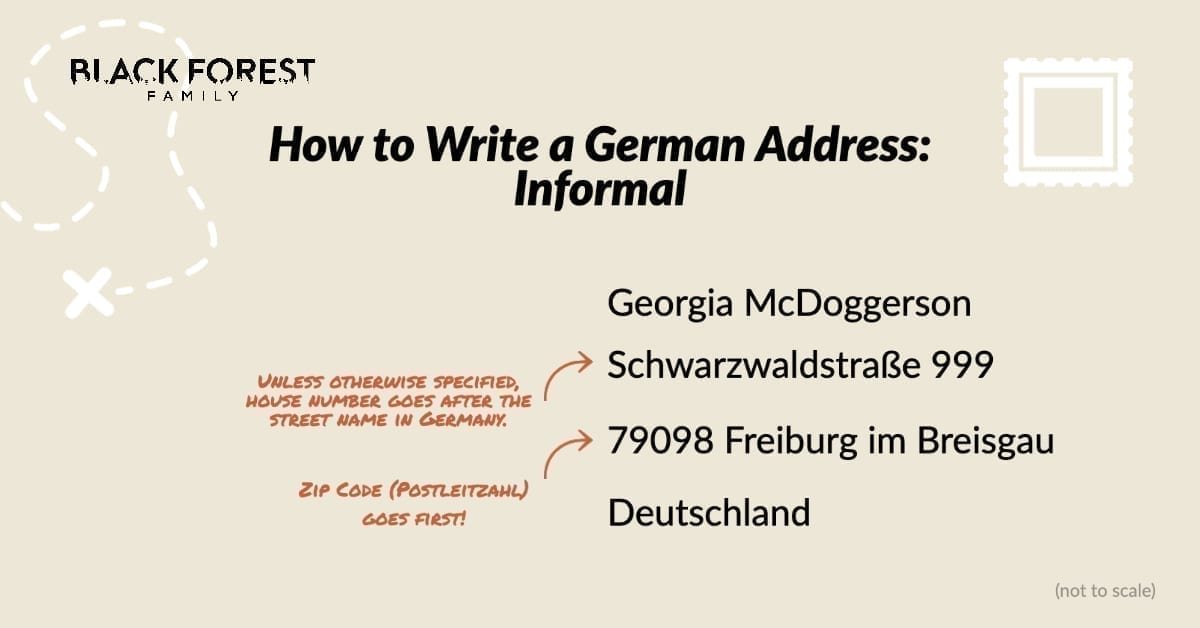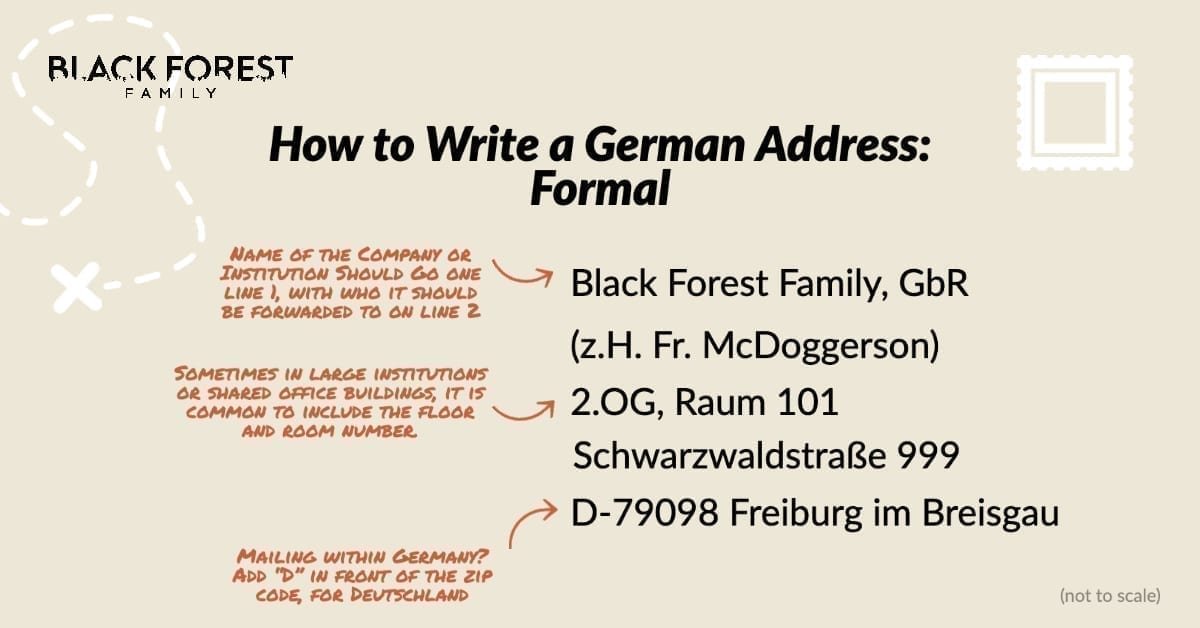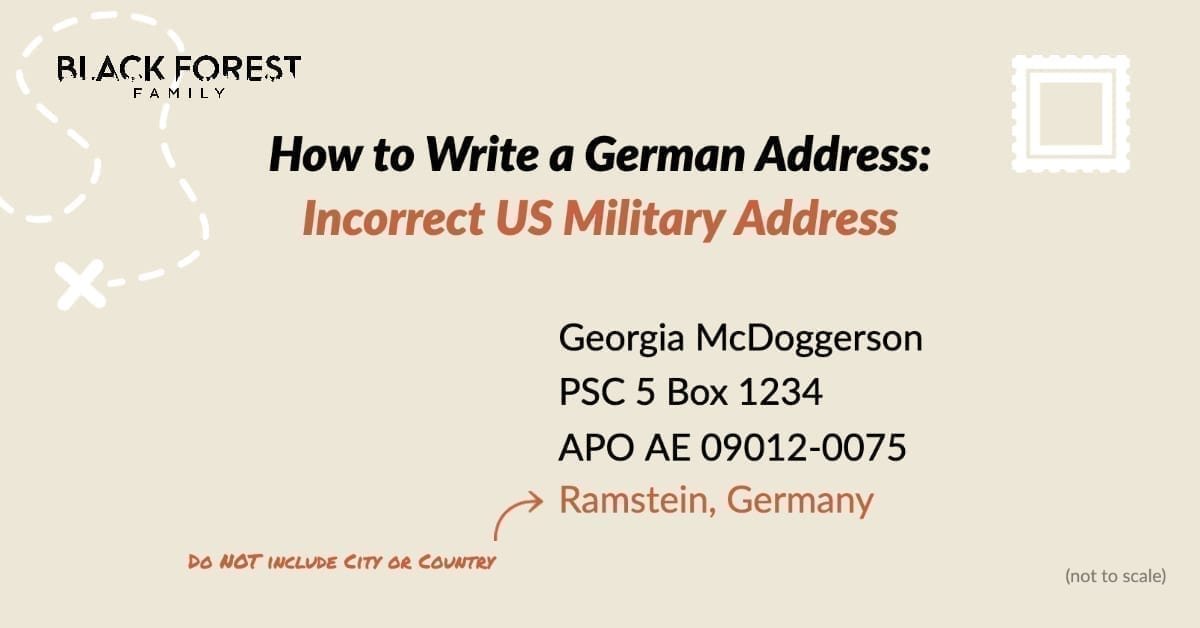HOW TO ADDRESS A LETTER IN GERMANY (WITH EXAMPLES)
Mailing a letter in Germany? Or maybe you are simply sending a package to friends or family abroad? Understanding mailing regulations in Europe is complicated. And you’ll likely need to know how to address a letter in Germany. Check out our tips and recommendations below, with examples on how to write a formal or informal address in Germany.
HOW TO ADDRESS AN INFORMAL LETTER IN GERMANY
When sending an informal letter, the german address format differs in subtle, yet important ways from mailing addresses in the U.S. or Canada. Let’s take a look at this example below.
First. you will notice that the house number is most commonly written after the street name in Germany. Second, you will also see that the zip code (Postleitzahl) is written before the city name.
If mailing a letter to Germany from another country, make sure to also include the country name on the 4th line of the letter. Although we have had no problems receiving mail with “Germany” written in English, you may want to include “Deutschland” to be extra clear.
HOW TO ADDRESS A FORMAL LETTER IN GERMANY
Formal letters in Germany get a bit more complicated. Let’s take a look at another example:
You will notice that in a formal letter, the name of the company or institution is written first. This is followed in line two by the person’s whose attention the letter is specifically addressed to.
Remember that when addressing a formal letter, you should include the title (or honorific) of the person you are corresponding with. Common title abbreviations in German are:
Herr (abbrev., Hr.) = used for men (equivalent to Mister (Mr.) in English)
Frau (abbrev., Fr.) = used for women (equivalent to Ms., Mrs. and Madam in English)
Fräulein (abbrev., Fr.) = used for unmarried women (like Miss in English).
Additionally, in the example above, “z. H” is an abbreviation for “zu Händen von“. This is the german postal equivalent to “c/o” or “attention/attn”. You can read more about other abbreviations in the section below.
In addition, depending on your recipient’s mailing address you may also need to list the floor and office number to address a letter in Germany. This is common if the recipient is in an office building with multiple companies or institutions.
Black Forest Family Tip
Sending a letter within Germany? No need to write “Deutschland on the 4th or 5th line of your address. Simply write “D” in front of the zip-code.
COMMON GERMAN MAILING ABBREVIATIONS & OTHER ADDRESS EXAMPLES
Much like writing letters in your home country, there are a number of abbreviations and unique situations you may come across.
Sending a letter “to the attention of” in Germany
When writing an informal or formal letter to send to Germany there is a very important consideration that most Americans or Canadians probably won’t initially recognize: make sure the name of the recipient is on the mailbox you are sending it to.
It may not be surprising to learn that most Germans live in Apartment buildings. However, unlike in the United States, each apartment does not have a separate address or apartment number.
In Germany, everyone who lives in that particular apartment building will share the same address. Therefore it is extremely important that you make sure the person you are sending a letter to has their last name written on the mailbox so that the postal worker knows which slot to put the letter into.
If you are sending a letter to a friend or family member who is temporarily staying with or visiting someone overseas, you must include the name of the main tenant on the envelope. For example, if you wanted to send a letter to our second dog, Java at her friend Georgia’s address, you must address the letter like this:
As we explain above, “z. H” is an abbreviation for “zu Händen von“. This is the german postal equivalent to “c/o” or “attention/attn”. The postman will put the letter in Georgia’s mailbox, to the attention of Java O’Barkley.
Street Abbreviations in Germany
Much like in the English speaking nations, street names can be shortened in German. For example, we may abbreviate St. for Street or Ave. for Avenue. Here are the most common abbreviations for German street names:
Schwarzwaldstraße may also be written as Schwarzwaldstr.
Schwarzwaldplatz may also be written as Schwarzwaldpl.
And
Schwarzwaldweg may also be written as Schwarzwaldw.
There are many abbreviations in Germany for streets, cities, and other regional addresses. For a more extensive list, we recommend reading more here.
How to Write Unique German Street Names
If you are regularly corresponding via mail in Germany, you are likely to come across a unique German street name that doesn’t follow the standard grammatical pattern. Here are a couple of rules that may help you properly address a letter in Germany and certainly impress your German-speaking friends.
There is a language rule that if a place or street name ends in -er it should be written separately, so “Freiburger Straße” is correct, but “Freiburgerstraße” is not.
In addition, German street names are built using ‘-‘ instead of a space for two and more words. For example, you should write ‘St.-Peter-Straße’ rather than ‘St. Peter Straße’ or ‘Sankt Peter Straße’.
P.O. Boxes in Germany
In Germany, P.O boxes are called “Postfach” and are written very similarly to its English equivalent. Simply replace the street name and number with the post office box address, as shown below.
Remember, iof a PO box address is used, it should be on the second line from the bottom. In this case, the last line consists of the postcode and city.
How to Format Military Mail Addresses (APO, FPO or DPO)
Did you know that Germany hosts the largest portion of US troops in Europe? As of 2021, roughly 38,600 military members are stationed in Germany. However, the numbers vary as troops are regularly rotated to other countries.
If you are sending letters or packages to a friend or loved one on a military installation in Germany is one important consideration.
Do NOT include the German “City” and/or “Germany” before or after the PSC, UNIT or APO number. Using the foreign city and country name will most likely cause the mail to be handled through international mail channels instead of the military postal system.
This is important because the German Customs Office (Zollamt) could levy import customs duties based on the merchandise value in the mail you receive through the international mail system.
For questions, contact your local Air Force, Army or Navy installation postmaster for additional information on how to properly address mail bound for overseas military postal service members.
WHERE TO PUT THE ADDRESS ON THE ENVELOPE
Last but not least, when mailing a letter to Germany or within Germany, you should naturally include postage and a return address.
Thankfully, the location of the addresses and postage stamps on German letters are the same as in North America and the rest of Europe.
However, there are additional formatting considerations when you address a letter in Germany according to Deutsche Post. Namely:
The recipient address should contain at least three lines , but may not be longer than six lines.
Unless otherwise technically provided, a letter should be labeled lengthways.
Neither the postcode nor the place name may be underlined .
If you want to be extra clear, you can label the sender’s address with “Abs.” (for Absender) and the recipient’s address with “Empf.” (for Empfänger). However, this is optional.







